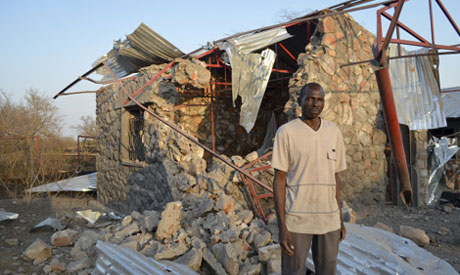
School Pastor Zachariah Boulus stands next to a building in the compound of the Heiban Bible College, following a bombing on Wednesday, at the school which was built by Samaritan's Purse, a North Carolina-based aid group, in Heiban, Southern Kordofan, Sudan, February 1, (Photo: AP).
A conference held on Tuesday in Cairo on the Arab Spring and the Sudanese crisis warned of the increasing dangers inherent in the situation in Sudan.
The event, which was organised by the Arab Coalition for Darfur, included a large number of thinkers, activists, and media personalities, hailing from 14 countries. It was held as a parallel conference to the Arab Summit which is to be held on 29 March in Baghdad, and the upcoming summit of the Organisation of Islamic Cooperation, the date of which is to be announced.
Conference members expressed strong worries about deteriorating conditions in Sudan, especially the escalating conflict in the states of South Kordofan, Blue Nile and Abyei, leading to civilians being subjected to air strikes, displacement and forced asylum.
International reports estimate the number of displaced Sudanese to approximately 300,000, with 78,000 refugees in the new state of South Sudan and 35,000 Blue Nile inhabitants seeking asylum in neighbouring Ethiopia since June 2011.
Speakers stressed that these conditions create the potential for widening the circle of violence in the rest of Sudan, destabilising both South Sudan and Sudan and ending chances of peace between the two states.
The conference also dealt with the state of human rights and freedoms in Sudan, and the relationship between those conditions and the Arab revolutions. They expressed their concern about the severe attack Sudanese authorities are currently perpetrating against freedom of speech by shutting down newspapers, as well as the violations inflicted on civil society organisations, journalists, activists and political opponents.
Conference members agreed that there was an important Arab role within Sudanese issues, for example by maintaining solidarity and support for victims of the humanitarian crisis in Sudan and against human rights violations, in place of previous partiality to the Sudanese government.
Speakers recommended that the Arab League and the Organisation of the Islamic Conference (OIC) play an active role in Sudan by pressuring the different parties to the conflict to stop aggression and by stressing the protection of civilians.
The conference appealed to the Arab League and the OIC to send an independent investigative delegation to probe the serious human rights violations against civilians in the various affected regions.
Speakers also implored both organisations to pressure the warring factions in Sudan to reconcile under international auspices, allowing the transfer of humanitarian aid. They also stressed that freedom of transportation for aid workers must be guaranteed for the aid to reach those affected by conflict.
In addition, they called on the Arab League and the OIC to demand the Sudanese government lift all restrictions on freedom of speech and peaceful gathering, providing Sudanese citizens with their right of peaceful civil protest, noting what was achieved in the Arab Spring. Also stressed was the necessity of meaningful and peaceful dialogue to enforce the common historical, cultural and social ties between both countries.
Short link: